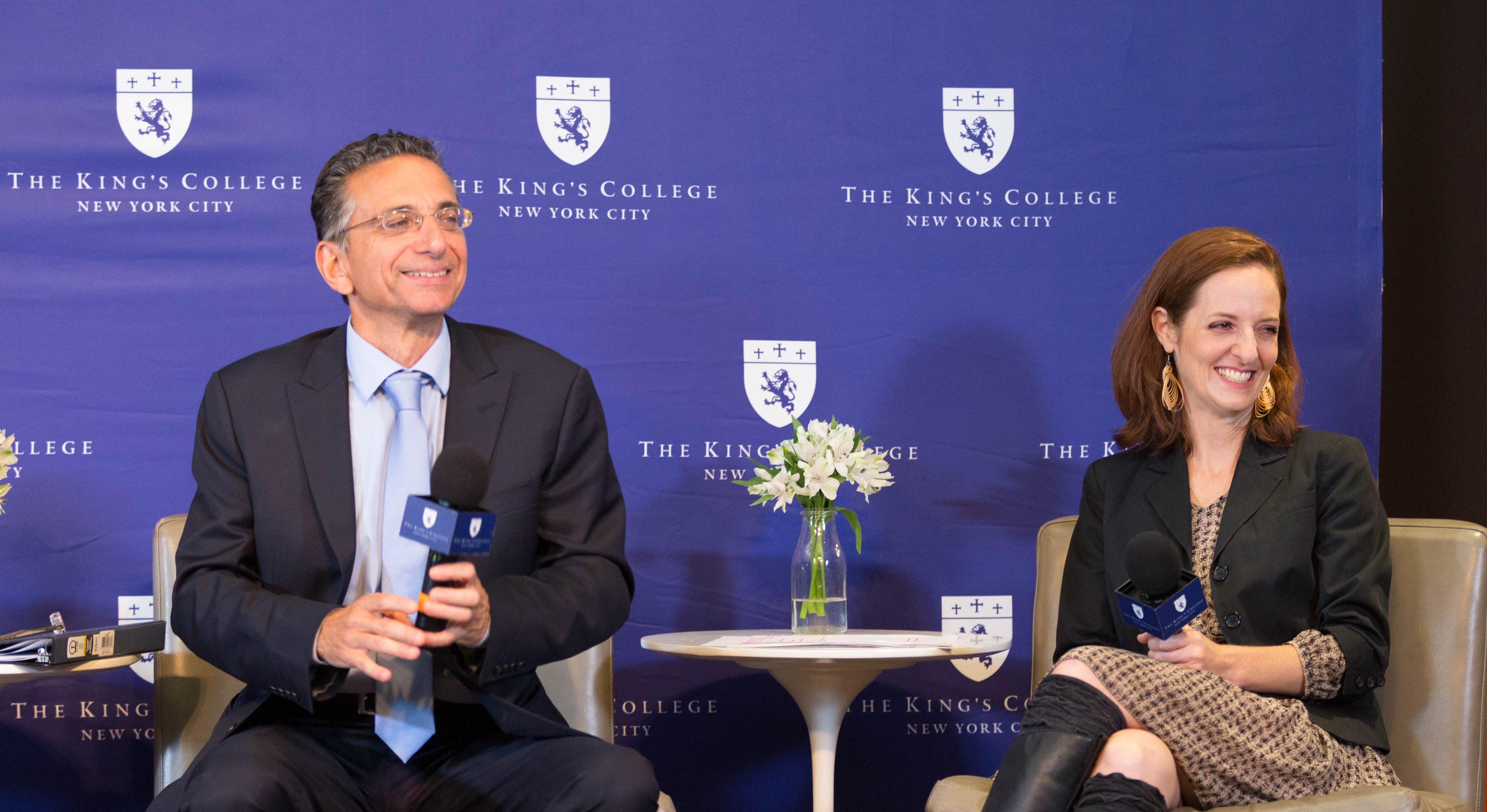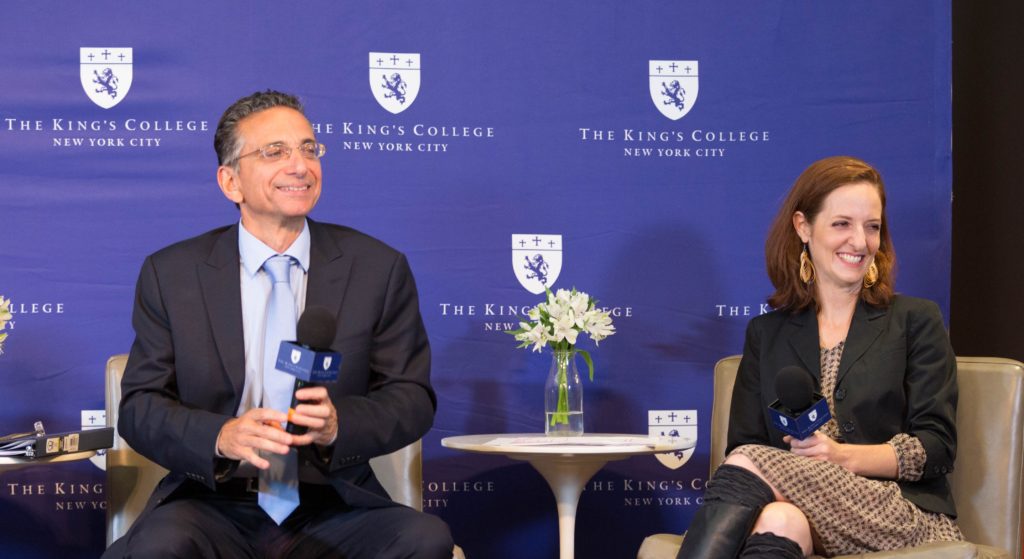“Conscience on Trial”: King’s Faculty Host Discussion of Martin Luther’s Legacy
In preparation for the 500th anniversary of the beginning of the Protestant Reformation, King’s faculty Joseph Loconte and Chris Cragin-Day hosted “Conscience on Trial: How Luther’s Reformation Renewed Western Civilization.”

On October 2, in preparation for the 500th anniversary of the beginning of the Protestant Reformation, King’s faculty Joseph Loconte and Chris Cragin-Day hosted “Conscience on Trial: How Luther’s Reformation Renewed Western Civilization,” a lunchtime event to provide some historical background and commentary on Martin Luther, the man responsible for it all. The interdisciplinary discussion ranged from a look at Luther’s political objections to the structures of medieval Europe to a reading from Cragin-Day’s play, Luther On Trial.
Dr. Loconte, associate professor of history, opened the discussion. He gave a vibrant historical summary of Luther’s life and activities with his typical eloquence and enthusiasm, entering the story in media res at the trial of Luther at Worms. Loconte’s talk emphasized Luther’s conception of religious liberty as the right of the individual to live in accordance with his conscience, even if his conscience tells him to defy the established Christian Church and reject the sacraments, the traditional means of grace. Luther’s radical new epistemology rejected external authority and insisted that the individual conscience, relying upon Scripture, is able to discern truth on its own. This idea quickly became the foundation of the Protestant Church, and remains so to this day.
WATCH: Loconte and Cragin-Day present ‘Conscience on Trial’
Loconte went on to explain how Luther’s ideas influenced much more than simply the Christian Church; his work had far-reaching political consequences as well. Through this elevation of the individual conscience over the structures and hierarchies of Christendom, Luther’s teachings introduced a “radical egalitarianism” into all of the governing institutes of Europe. Through Luther’s stand, Loconte said, human freedom became the central element of Western political thought. It is not an exaggeration to say that Luther led to the invention of the modern idea of mankind, and all it entails – the rejection of hierarchy in both politics and religion, the democratization of government, and the collapse of medieval Christendom as a political order.
But Loconte also emphasized some of other elements of Luther’s life and thought that caused difficulties for burgeoning Protestantism, most notably the vitriolic anti-Semitism present in his later writings. Chris Cragin-Day, assistant professor of English and theater and noted playwright, presented a section of her play Luther on Trial that addresses this very issue. She recalled how, when she was approached to work on a play about Luther’s life, she committed to telling the whole story in hopes of presenting a more cohesive portrait of a sometimes baffling historical character.
In the section read at the event, she delves into an event earlier in Luther’s life that may explain, though certainly not excuse, some of his evident frustration with the Jewish community. Luther, after his stand at Worms and during his efforts to speedily translate the Bible into German, invites a Jewish rabbi to visit him in hopes of forging a relationship between the new Protestant group and the Jewish community. His thought is that, as both groups have experienced hardship at the hands of the Catholic Church, surely they can unite and find some common ground from which to support each other. After an artfully written theological discussion (neither oversimplified nor bogged in details), it becomes clear that the question of the divinity of Christ is indeed an insurmountable barrier between the two groups. The Jewish rabbi tells Luther that he can expect no theological support from his community, and Luther is left again alone. The beautifully crafted scene evokes the sense of pervasive conflict that so marked the historical period, as groups began shoring up their positions and compromise became rare. Cragin-Day read the part of Katie, Luther’s wife; Loconte read for Luther, and Zachary Owens (‘18) read the part of the Jewish rabbi. Loconte said of the reading, “Thanks for Chris Cragin-Day and her play, we faced Luther’s great weaknesses honestly, and see how difficult it can be to overcome the dark forces of prejudice in society.”
Later, during Q&A, Dr. David Tubbs, associate professor of politics, asked Loconte to speak in more detail about the Anabaptist controversy, in which Luther apparently went back on his ideals of freedom of conscience by refusing to allow the Anabaptists, one of the rapidly proliferating Protestant splinter groups, to teach their doctrine against infant baptism. Luther’s own ideas lead naturally to the conclusion that even heretics must have the right to proclaim and teach others about their views, but he actively repressed the Anabaptists. This is one of the great central conflicts in Protestantism, and Loconte acknowledged the difficulty of finding a balance between the supremacy of freedom of conscience and the idea that remaining in error is probably not a right. Cragin-Day responded to Tubbs’ question by pointing out that the Anabaptist incident is another example of the complexities of Luther’s character and his struggles to live up to his own principles.
A King’s alum who attended the college in 1980-1981 was also in attendance, and he asked a question about the theological situation in contemporary Germany, where liberal Protestantism is dominant. He shared that he recently traveled to Wittenberg and was surprised to see that almost every event celebrating the 500th anniversary of Luther’s 95 theses was sponsored by a liberal Protestant group. Loconte explained that the historical context of Germany as the center of critical studies in the 20th century has led to it being a stronghold of liberal Protestantism, which loses sight of key doctrines like the doctrine of sin and leads to grave doctrinal error.
Other questions included whether Luther was inspired by God, and how much his early life in a rough mining town may have influenced his theology and his approach to authority.
Afterwards, Loconte said that he found the event to be terrific, and that he hopes attendees came away with a deeper understanding of Luther’s life and achievements in defending the Gospel. Cragin-Day said of the event, “One of the delightful things about teaching at King’s is the extent to which faculty in different disciplines have the opportunity to engage with one another. The Martin Luther event reminded me of how thankful I am for that aspect of my work here.”





